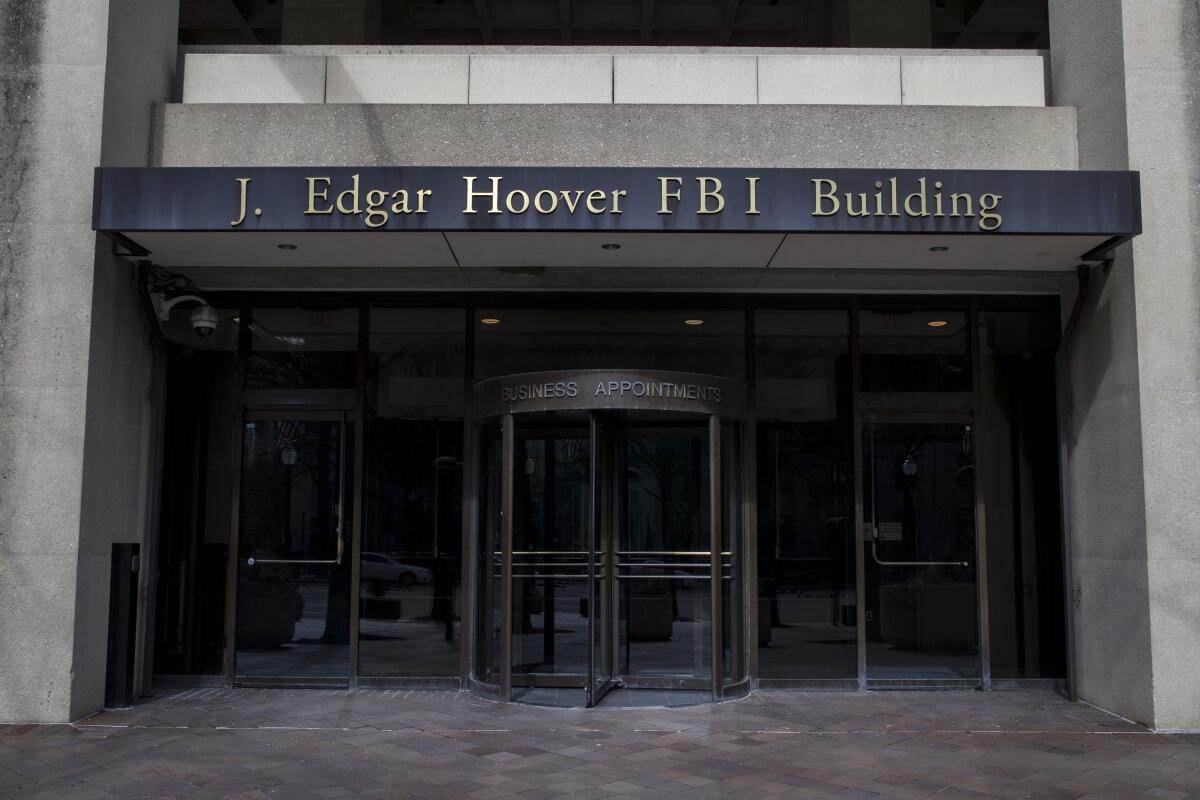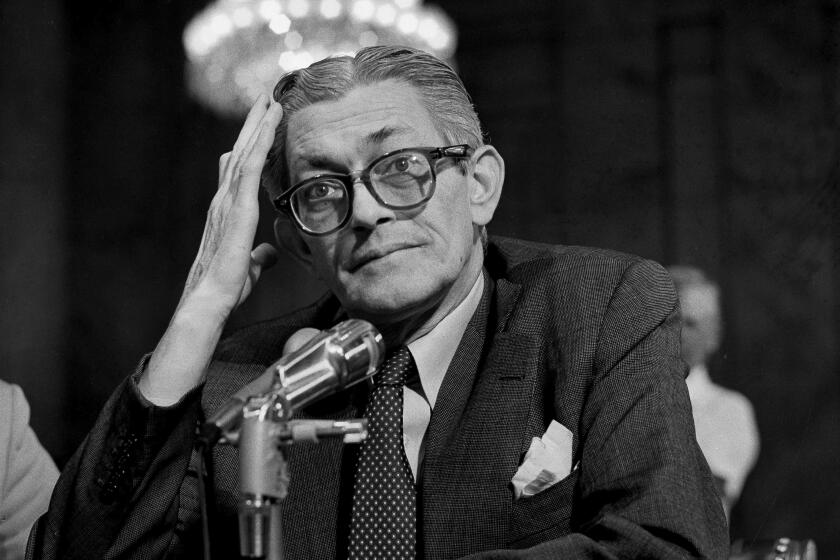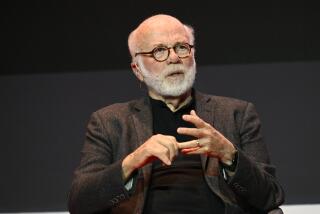Column: Why do we still honor J. Edgar Hoover’s racist, homophobic legacy?

- Share via
Fifty years ago this week — on May 2, 1972 — J. Edgar Hoover, the director of the Federal Bureau of Investigation, died at his home near Washington’s Rock Creek Park, and was found the next morning by his housekeeper slumped on the floor next to his bed.
In the days that followed, he received fulsome praise. President Nixon eulogized him as a “giant” and a “legend” who personified integrity, honor, principle and courage, who had fought all his life against the “trend of permissiveness” that Nixon said was eroding the country. Supreme Court Chief Justice Warren Burger called Hoover a “splendid man” who “would not sacrifice principle to public clamor.”
But the full story wasn’t being told. In fact, Nixon had hoped to push Hoover out of the job just a few months earlier but feared the director’s retribution. At least four other presidents reportedly had hoped to remove him as well but were unable to or didn’t dare.
Opinion Columnist
Nicholas Goldberg
Nicholas Goldberg served 11 years as editor of the editorial page and is a former editor of the Op-Ed page and Sunday Opinion section.
Hoover was no American hero. He was a bigot, a racist and a homophobe — a conspiracy theorist who amassed and abused enormous power, pursued his enemies unscrupulously and trampled on the civil liberties of law-abiding American citizens.
So here’s a proposal on the anniversary of his death: Let’s take the opportunity to right an egregious wrong by stripping Hoover’s name off the big, brutalist J. Edgar Hoover FBI headquarters on Pennsylvania Avenue in Washington.
It never belonged there. He deserves no such honor.
For those who don’t remember the Hoover days, here’s a quick review.
A malicious tip from the FBI to the L.A. Times 50 years ago sent a rising young actress spiraling into depression.
He headed the bureau for 47 years, beginning in 1924 and ending only when he fell out of bed and died at age 77.
On his watch, to give him his due, agents helped solve the Lindbergh baby kidnapping case and arrested (or in some cases killed) Depression-era gangsters such as John Dillinger, Machine Gun Kelly, Pretty Boy Floyd and Baby Face Nelson. Hoover supervised the capture of Nazi saboteurs during World War II and Soviet spies during the Cold War.
But he became too powerful, stayed in the job too long and believed himself and his organization exempt from rules, laws and the Constitution itself.
Hoover’s FBI illegally compiled thousands of dossiers on groups that were not engaged in crime or violence. He undertook a campaign against suspected gay and lesbian people working for the federal government, putting together more than 360,000 files in hopes of removing “sexual deviates” from their jobs. He was an anti-communist zealot of the ugliest sort.
The recent allegation that the CIA is gathering data on American citizens received little attention — unlike when that happened in the 1970s.
His putative bosses in the White House didn’t stand up to him at least partly because they feared he would take revenge by releasing disparaging information about them. “You don’t fire God,” President Kennedy reportedly said.
In 1956, Hoover created the now-notorious COINTELPRO program to “disrupt,” “discredit” and “neutralize” radical organizations and their leaders. The FBI forged documents, spread derogatory rumors, conducted warrantless break-ins and engaged in illegal surveillance, among other tactics. It sought to break up marriages, disrupt meetings, destroy reputations, provoke rivalries. Its targets were not just spies, Klansmen and violent, militant organizations, but also civil rights groups and anti-Vietnam war groups engaging in peaceful protest protected under the 1st Amendment.
One of the bureau’s chief targets was Martin Luther King Jr.
Publicly, Hoover called King “the most notorious liar in the country.” Privately, he called him a “burrhead” who needed to be destroyed. At Hoover’s direction, FBI agents planted wiretaps in King’s home and office, and placed bugs in his hotel rooms, and then peddled what they’d learned about his sex life to the press.
Historian Taylor Branch says that Hoover “manipulated” Atty. Gen. Robert Kennedy to sign off on the King wiretaps with “implicit threats” about revealing John Kennedy’s extramarital affairs.
In 1964, a top deputy to Hoover sent an anonymous letter to King calling him a “filthy abnormal animal,” accusing him of adultery and of participating in orgies — and seemingly urging him to commit suicide. (“There is but one way out for you.… You know what it is.”) The letter came with an audiotape the bureau had recorded surreptitiously in King’s hotel room. It was received not by King but by his wife, Coretta.
The first entry in the FBI file is dated Oct. 8, 1965: A bureau informant has picked up word that Cesar Chavez, the charismatic migrant worker who was seeking to organize California farm laborers, “possibly has a subversive background.”
“Nobody ought to be naming anything after the likes of J. Edgar Hoover,” says Rep. Gerry Connolly (D-Va.), who has introduced a bill to remove Hoover’s name from the FBI building. “He was a despicable character. He’s no role model.”
Connolly noted that if the FBI moves forward with plans to relocate from D.C. to the suburbs, it is imperative that Hoover’s name not be relocated along with it.
In general, I’m not the biggest fan of ripping down statues or disappearing the names of historical figures. I believe people should generally be viewed in the context of the times when they lived. And I believe we can honor flawed people whose good qualities outweighed their bad ones.
But I don’t believe Hoover’s good outweighed his bad. Having his name on the FBI building insults the U.S. Constitution.
Nixon — whose own respect for the Constitution left something to be desired — said in his Hoover eulogy that the FBI director should be remembered so “the profound principles associated with his name will not fade away.”
And that’s true. His principles, or lack of them, should be remembered, so that we don’t find ourselves going down the same road again. Former FBI Director James B. Comey, for instance, kept a copy of the Martin Luther King wiretap request on his desk as a reminder of the bureau’s past mistakes.
But neither Hoover nor his so-called principles should be honored.
More to Read
A cure for the common opinion
Get thought-provoking perspectives with our weekly newsletter.
You may occasionally receive promotional content from the Los Angeles Times.













